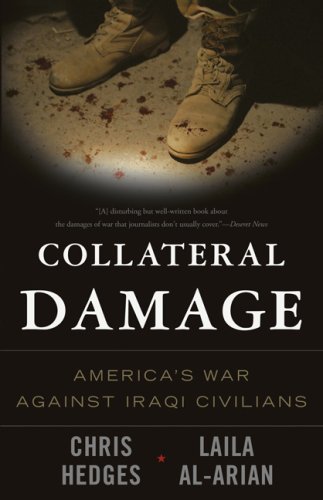Weekly Signals

Hedges and journalist Laila Al-Arian spent the past year interviewing over fifty veterans to expose the patterns of the occupation in Iraq. The testimonies of these soldiers—many of who remain deeply traumatized by their experiences—uncover how the very conduct of the war and occupation have turned the American forces into agents of terror for most Iraqis.
Collateral Damage is organized around key military operations — Convoys, Checkpoints, Detentions, Raids, Suppressive Fire, and “Hearts and Minds.” Military convoys traveling at tremendous speeds through towns have become trains of death. Civilians are routinely run over or shot to death. Soldiers fire upon Iraqi vehicles with impunity at checkpoints. Late-night detentions based on shoddy intelligence terrify women, traumatize children, and radicalize the young men caught in their dragnet.
These soldiers have found the moral courage to speak out about the true nature of a war that has become one long, unchecked atrocity, and has given rise to the instability, sectarian violence and chaos that we witness today in Iraq.
Hedges, currently a senior fellow at The Nation Institute and a Lecturer in the Council of the Humanities and the Anschutz Distinguished Fellow at Princeton University, spent nearly two decades as a foreign correspondent in Central America, the Middle East, Africa and the Balkans. He has reported from more than 50 countries, worked for The Christian Science Monitor, National Public Radio, The Dallas Morning News and The New York Times, where he spent fifteen years. Hedges is also the author of the best selling War Is a Force That Gives Us Meaning, which draws on his experiences in various conflicts to describe the patterns and behavior of nations and individuals in wartime.
To Listen to the Interview
No comments:
Post a Comment